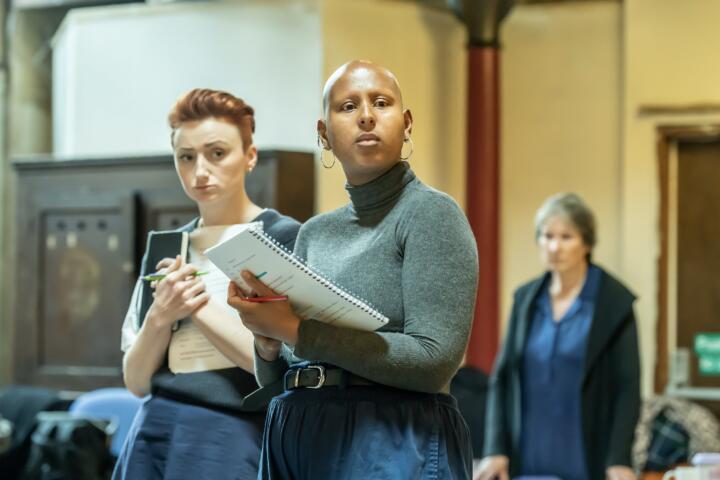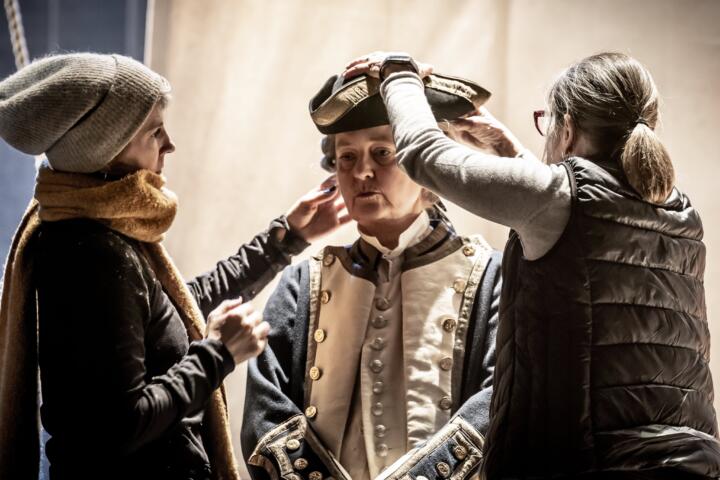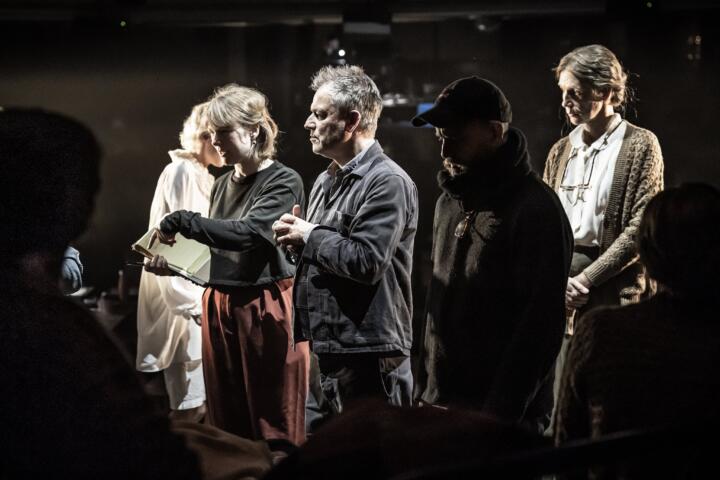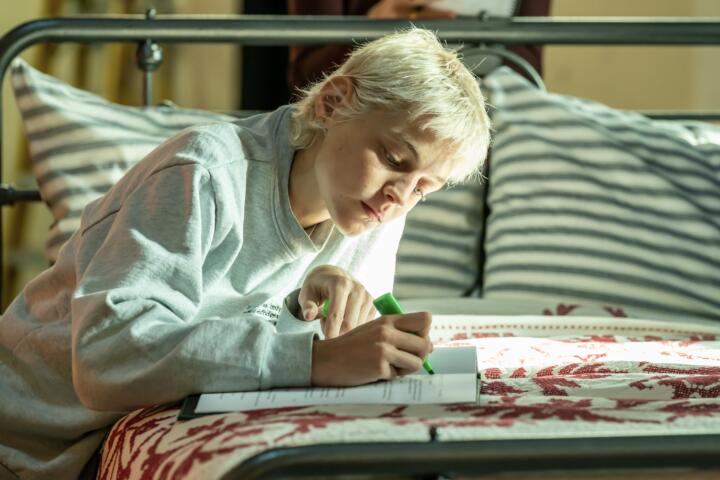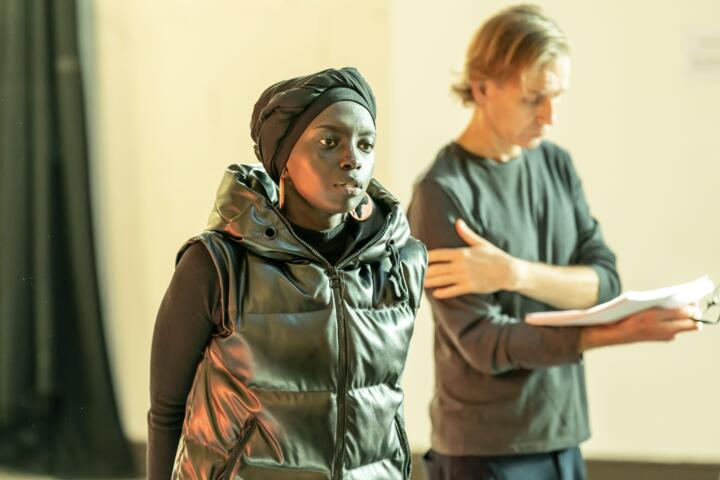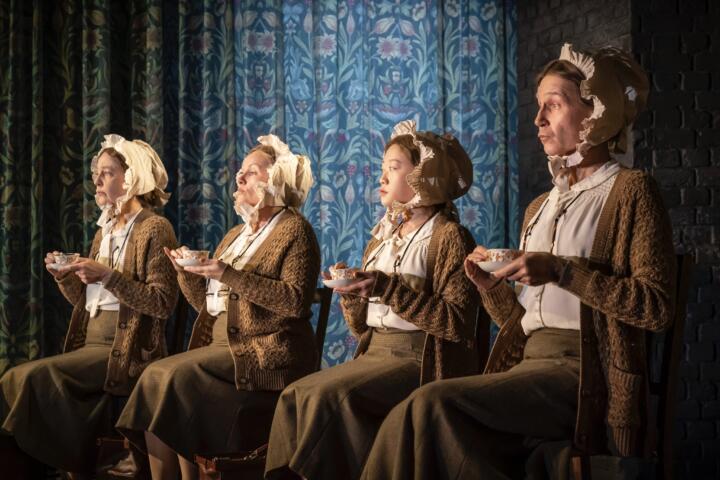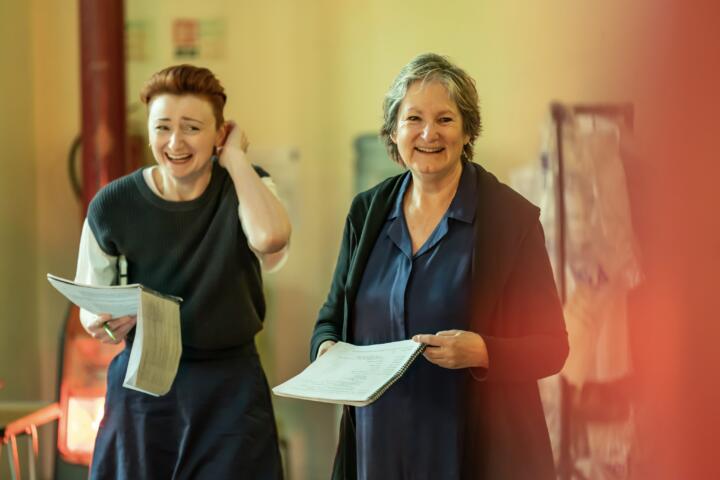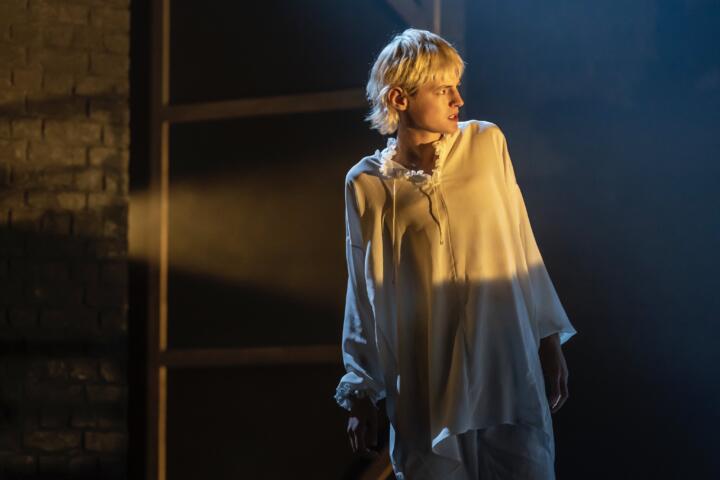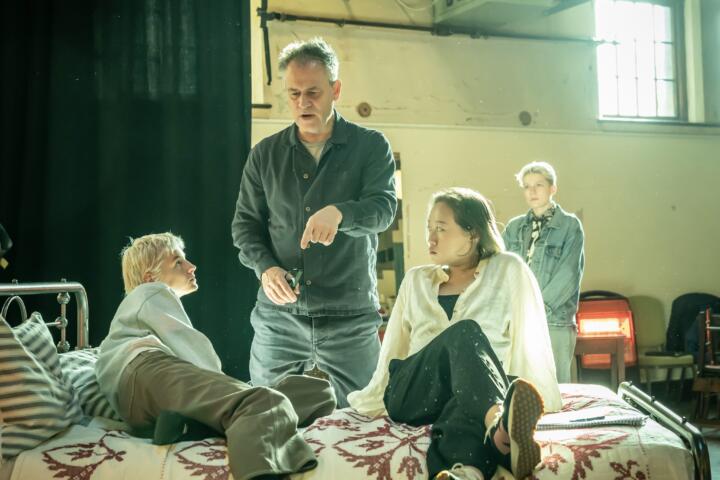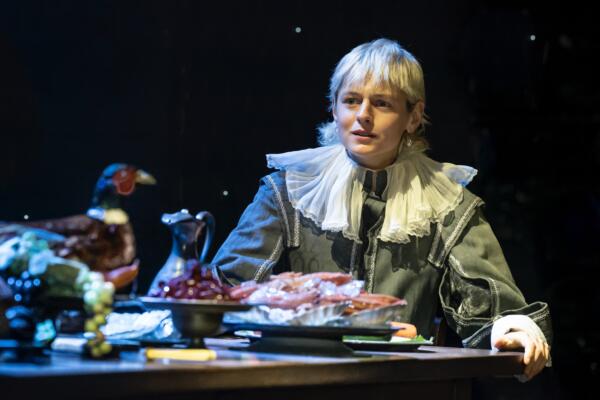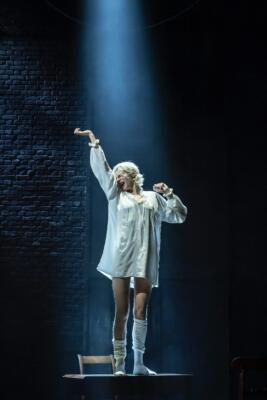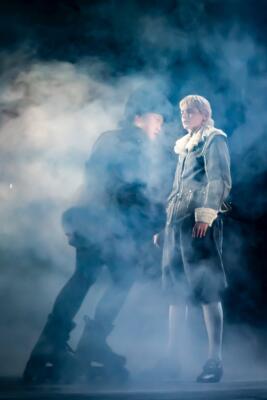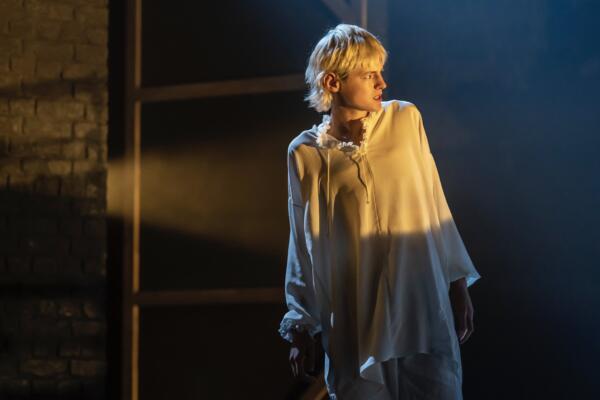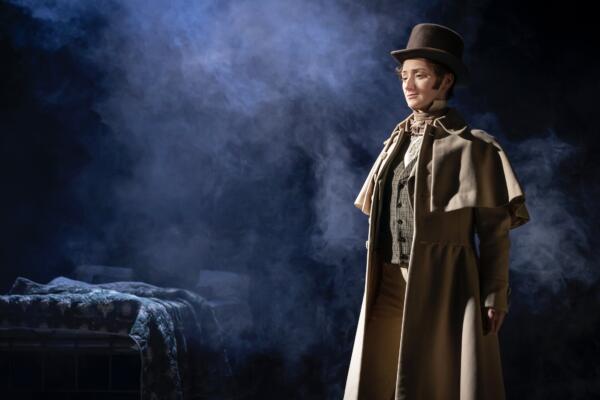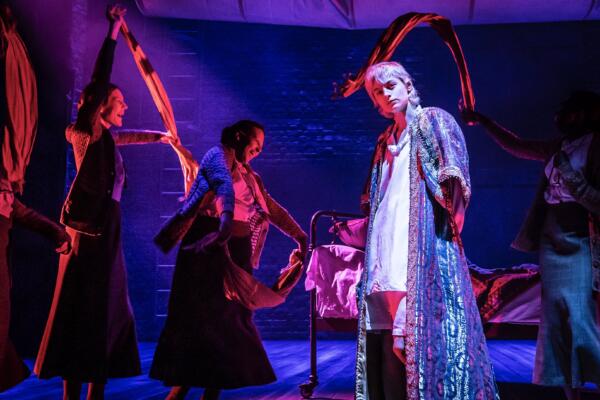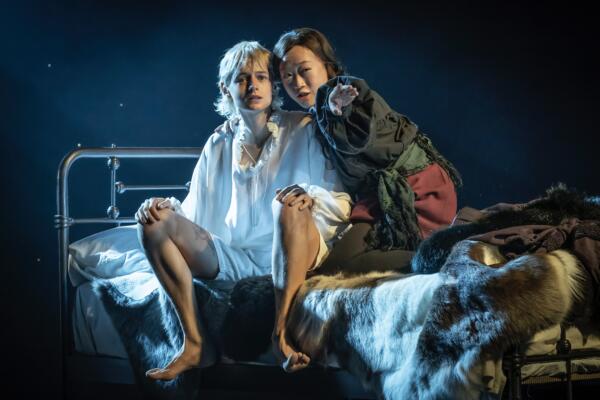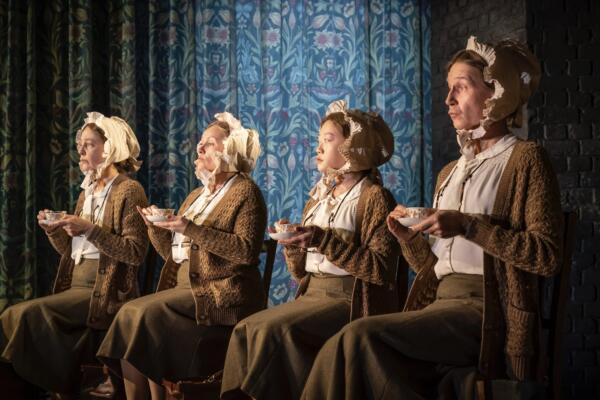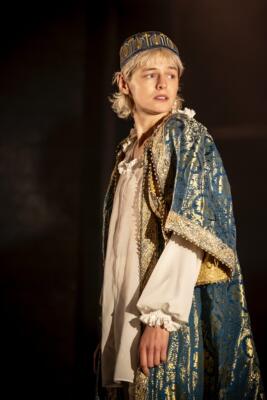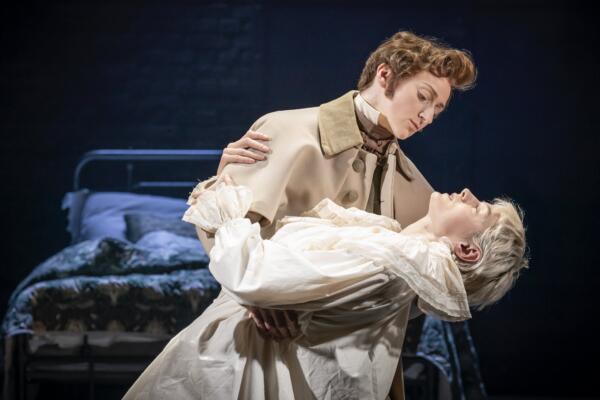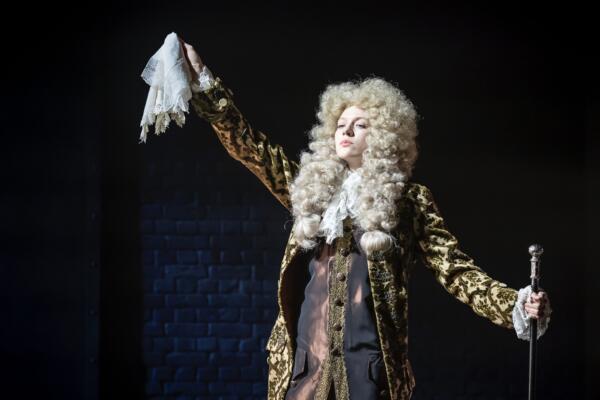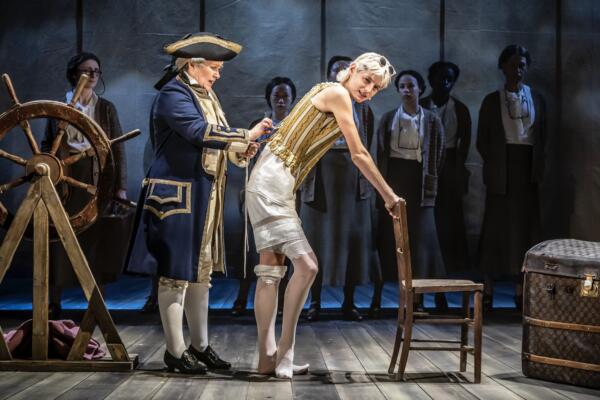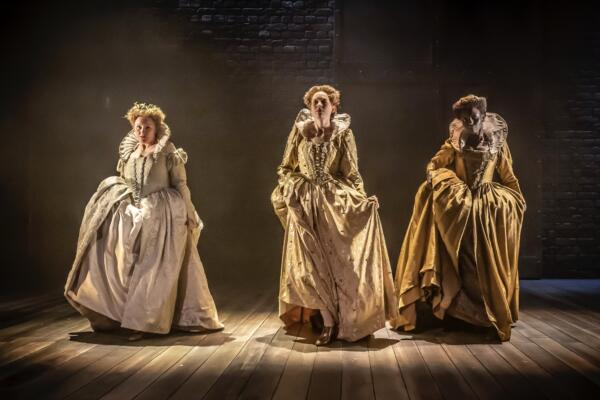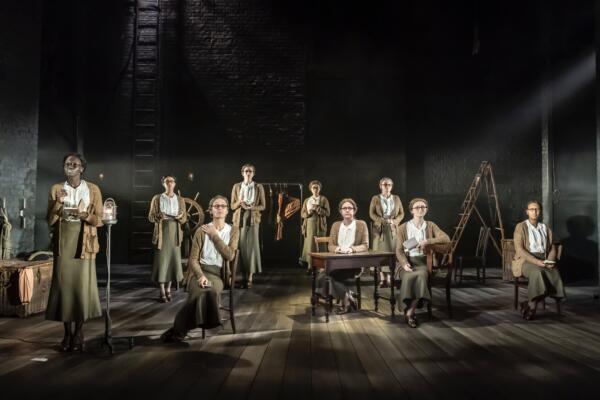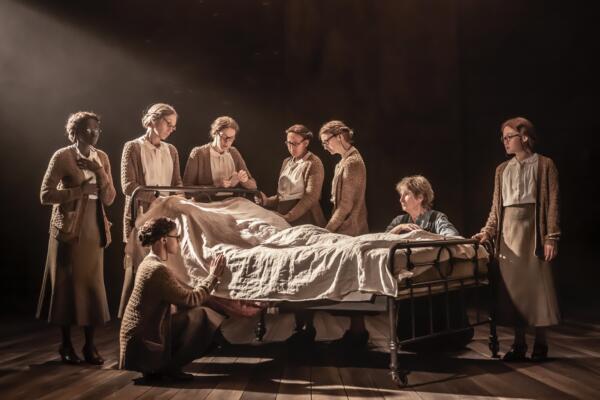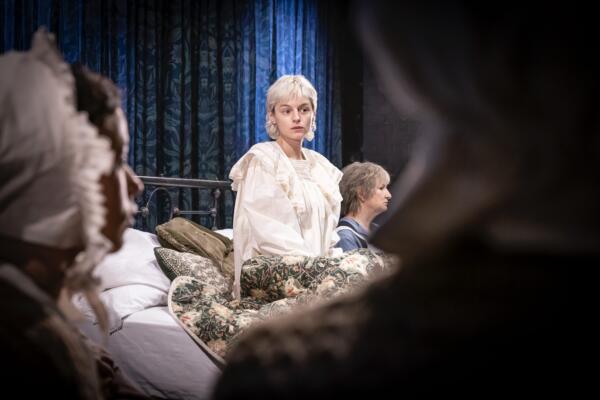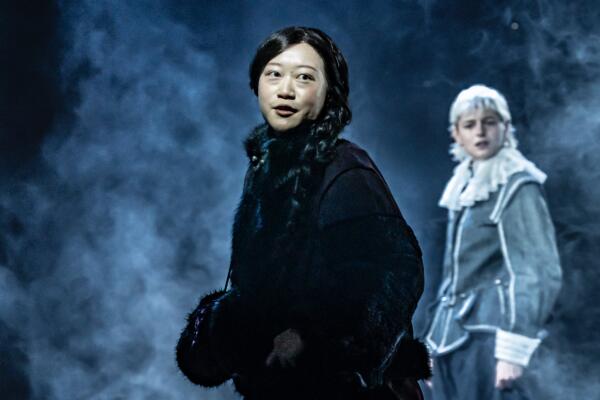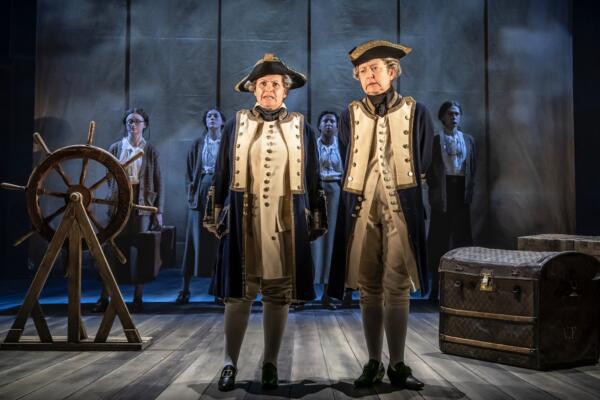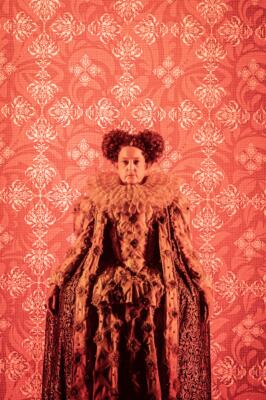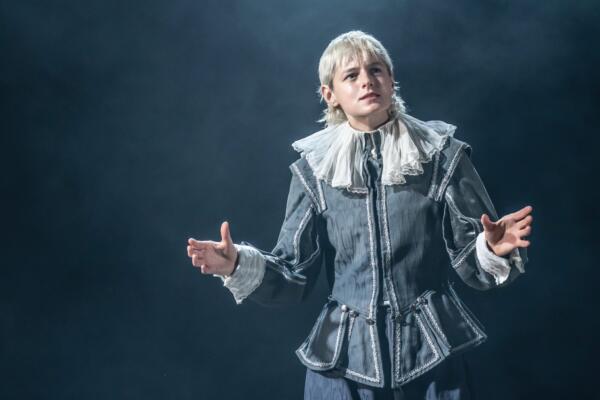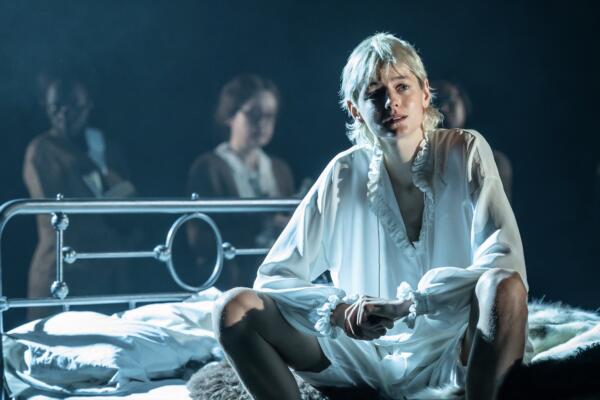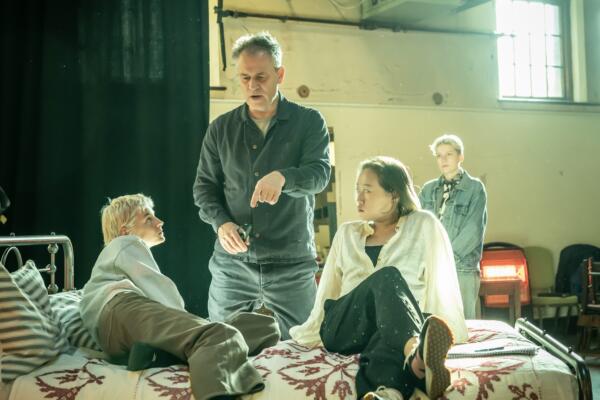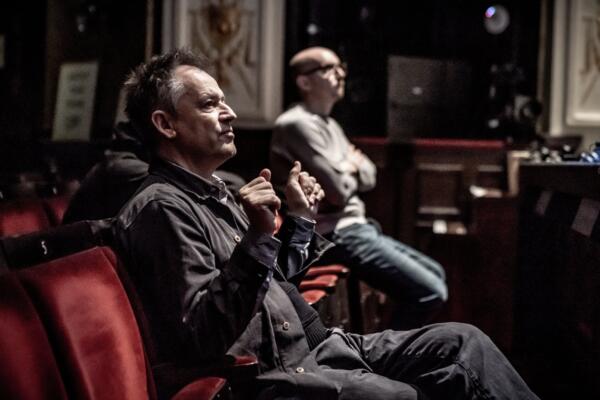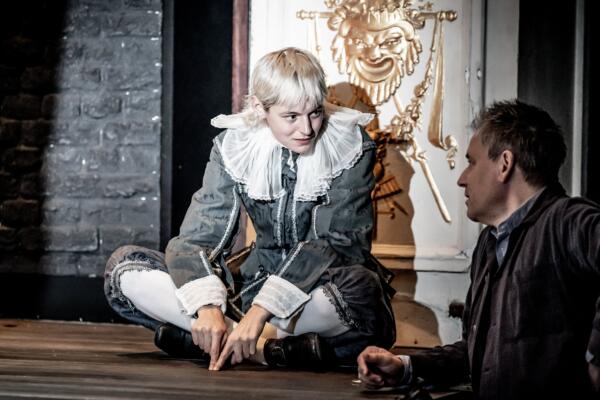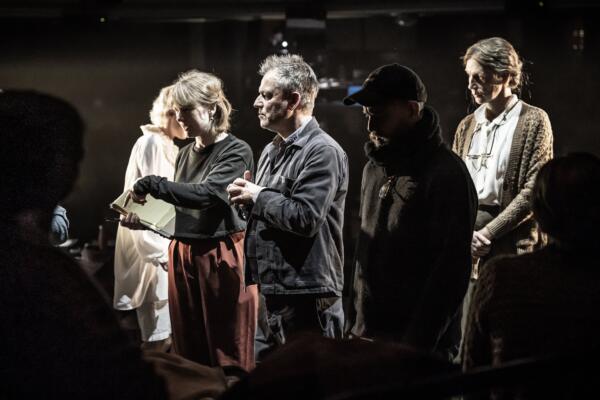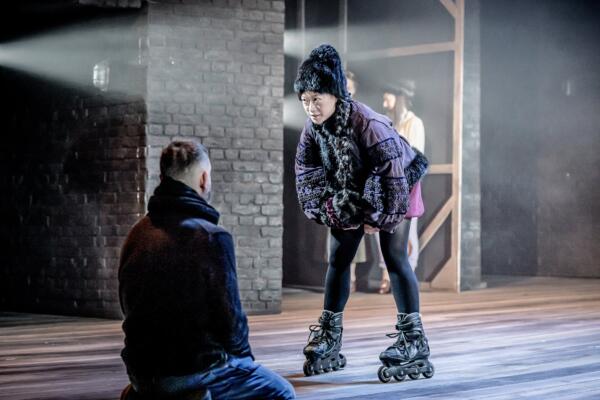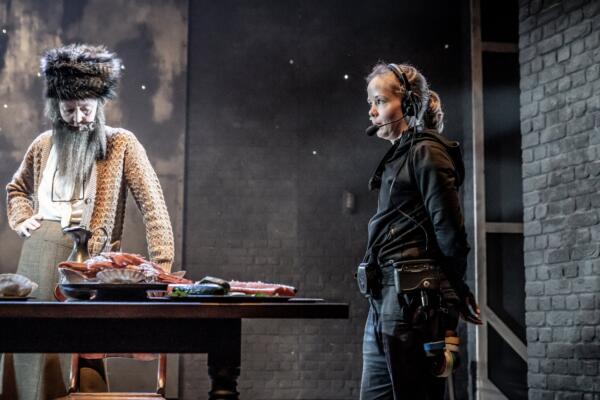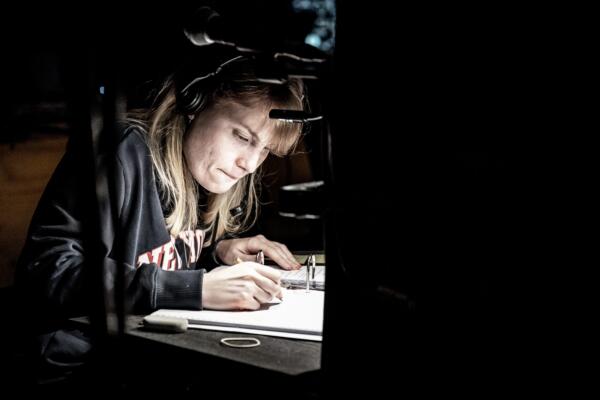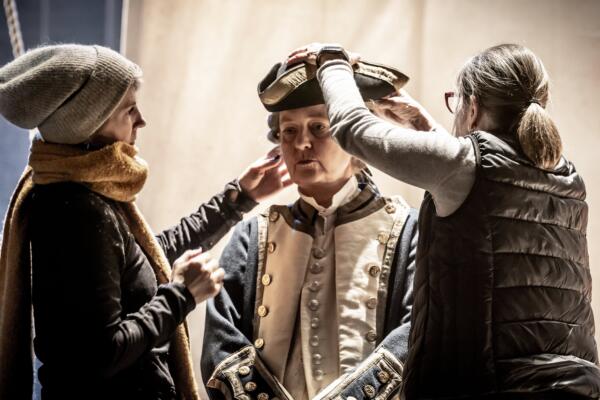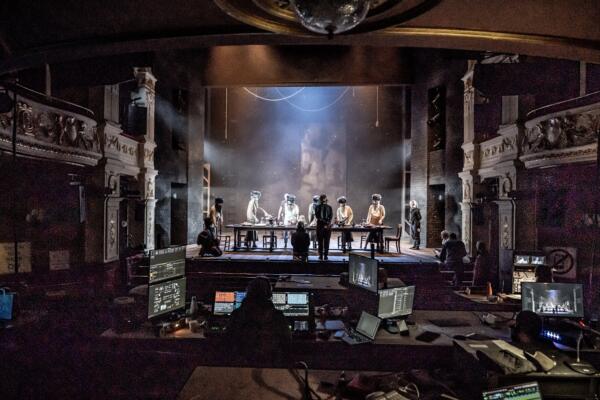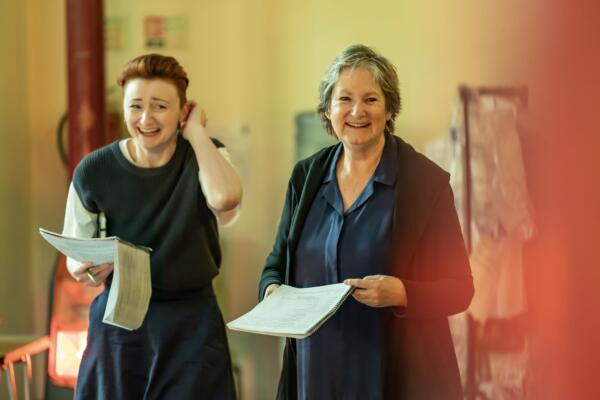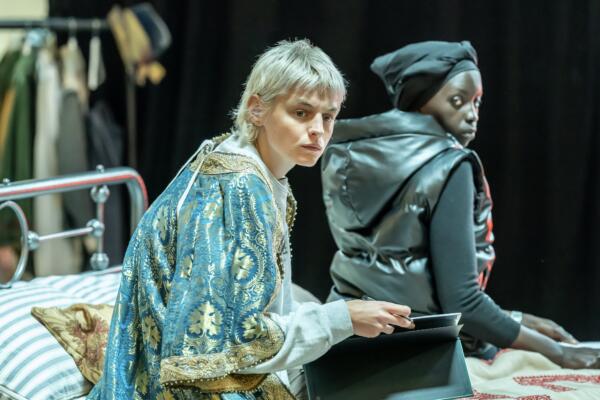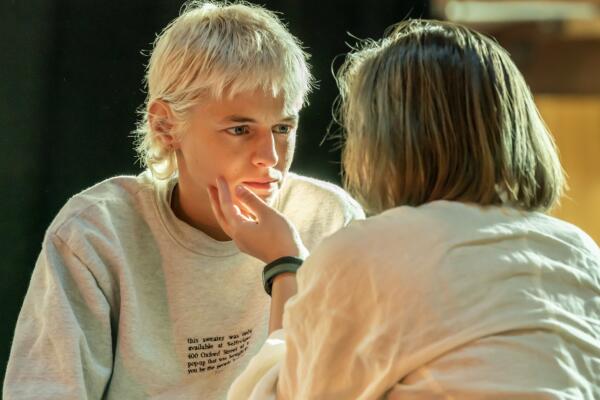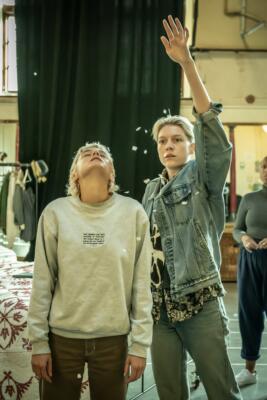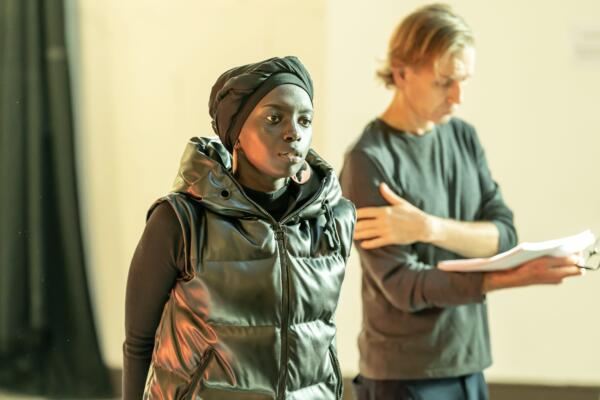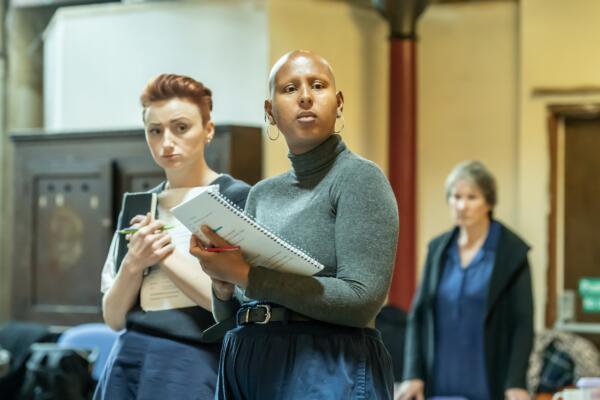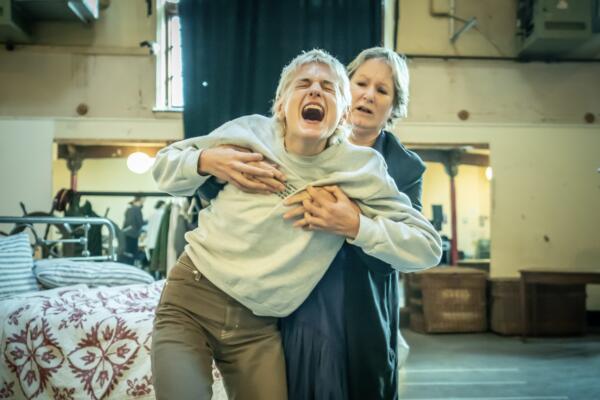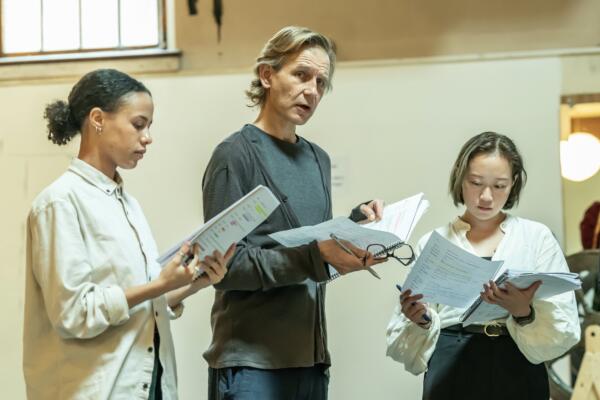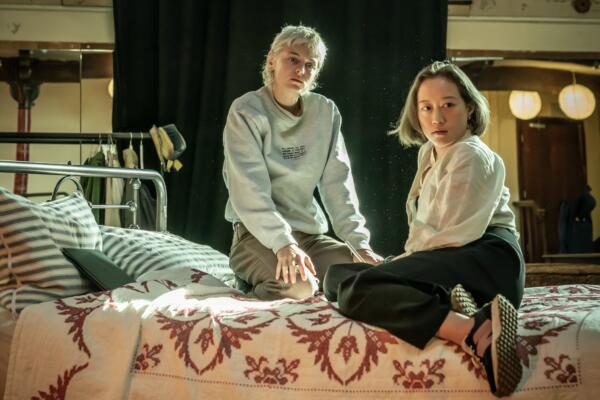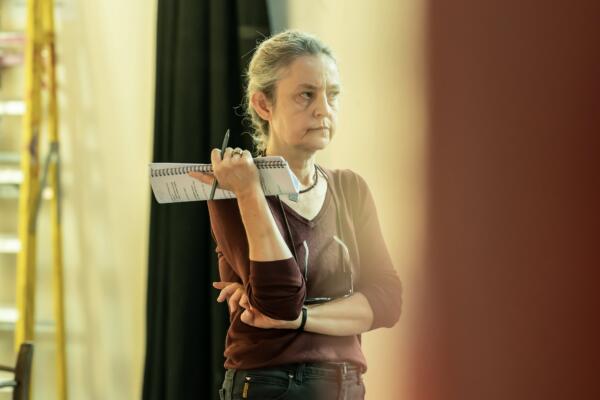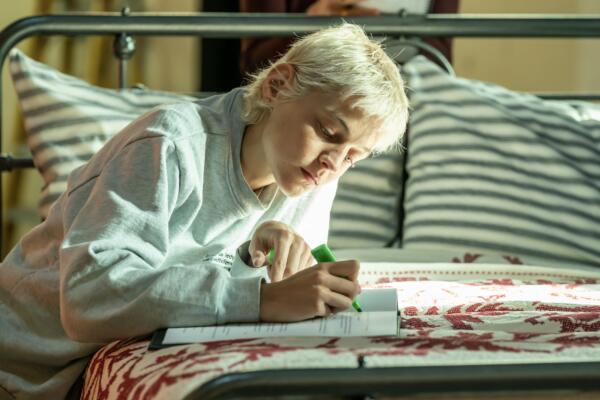Orlando
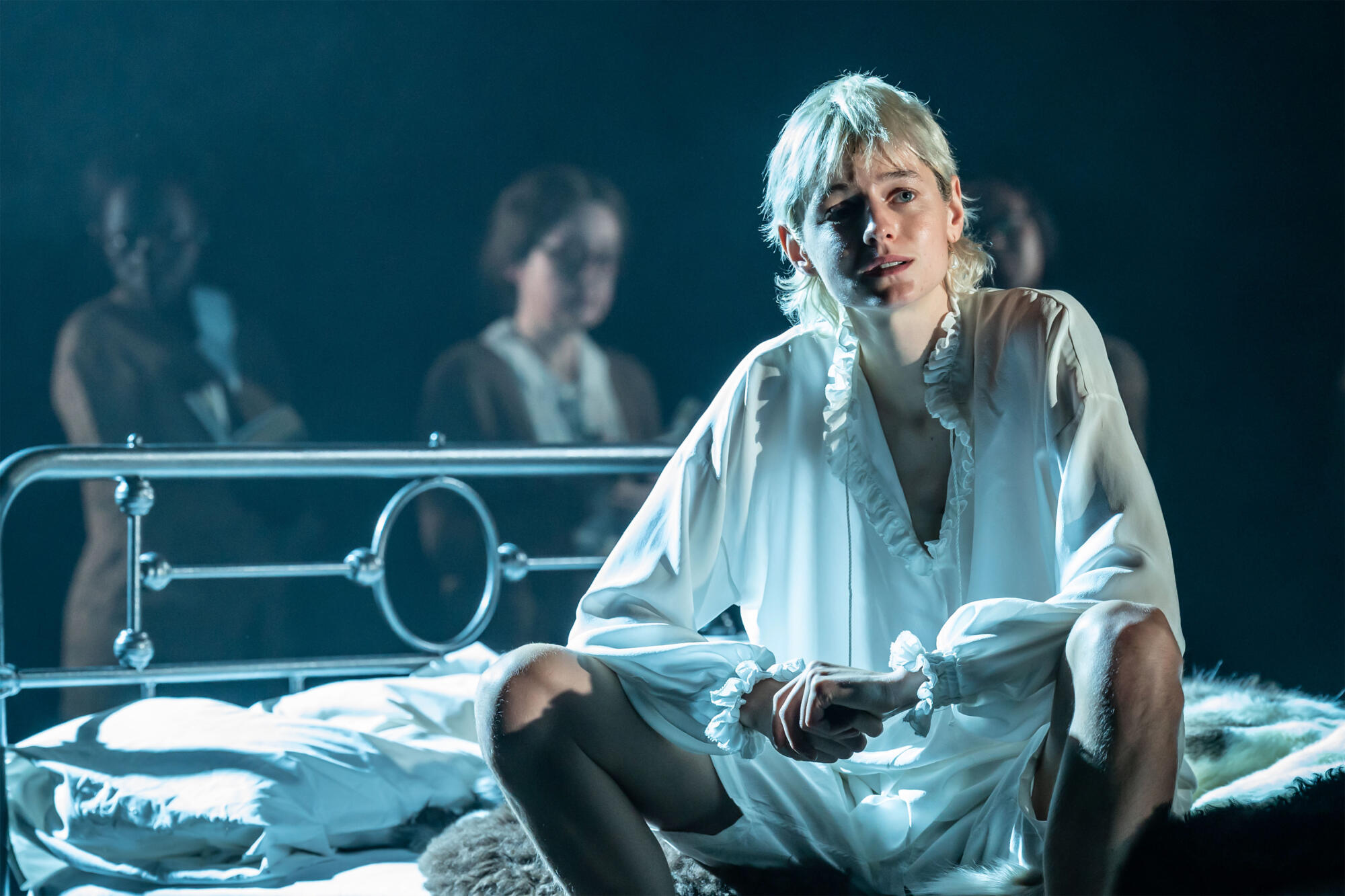
About the work
2021
Welcome to the Michael Grandage Company’s production of Orlando, a new play based on the novel by Virginia Woolf
The Michael Grandage Company and Sand & Snow Entertainment present the world premiere of Orlando, a new play based on the novel by Virginia Woolf, adapted by Neil Bartlett. A love story, hundreds of years in the making comes to the Garrick Theatre from 26th November 2022 to 25th February 2023.
Golden Globe winner Emma Corrin leads an ensemble company in Neil Bartlett’s joyous new adaptation of Virginia Woolf’s visionary masterpiece, directed by Tony and Olivier winner Michael Grandage.
In the court of Queen Elizabeth I, the young nobleman Orlando begins his search for identity as he embarks on one of the greatest adventures in all of literature. Travelling through time and place he is catapulted into the court of King James, falls in love with a Russian princess, witnesses London freeze over and wakes up under the blazing sun of Constantinople transformed into a young woman. She continues her journey up to the present day in search of happiness, self-knowledge and the courage to answer one fundamental question… WHO AM I?
Olivier Award winner Deborah Findlay joins Emma Corrin and a company of nine actors in a spectacular romp through four centuries of gender-defining history to bring Virginia Woolf’s epic story to life.
“Virginia Woolf was a woman ahead of her time and I am forever amazed at how relevant the themes in Orlando are today, when conversations about gender fluidity are taking centre stage. She provides an ideal source material to contribute to these conversations through theatre. Neil Bartlett’s fantastic adaptation is all about capturing the essence of the novel and we wanted to build on this in a production where transformation and mutability are part of the theatrical convention. Men dressed as women, women dressed as men, a fragmented Virginia and a character that travels through history, reflecting on the complexities of gender identity. Orlando provided a very exciting opportunity to make a political statement without being on the nose, allowing us to tell a poignant story that is now more relevant than ever.”
Michael Grandage, Artistic Director, MGC
England, 1928.
Pioneering author Virginia Woolf, a complex woman of many selves, is about to embark on her most ambitious novel yet… A fictitious biography spanning three hundred years of 15-year-old noble boy, Orlando, born in sixteenth-century England and aided throughout the years by loyal serving woman and informed gossip, Mrs Grimsditch.
The account begins in 1596 with the sudden arrival at Orlando’s country house of Queen Elizabeth I. She is immediately attracted to the thoughtful teenager, intending to offer him a privileged position at court and in her bed, but is vexed to discover he’s no longer a virgin.
Virginia moves her narrative forward to 1603 and the reign of King James I, in whose court Orlando receives honours and several proposals of marriage, including one from the high-born Euphrosyne. But the introspective young man’s not interested in what most men desire, until the year 1606 and the Great Frost, when the River Thames freezes over and Orlando meets and falls helplessly in love with the mysterious Russian princess, Sasha. They plan to run away together but Sasha fails to materialise at their midnight rendezvous and Orlando is left devastated.
Virginia and Mrs G look on as the heartbroken nobleman retreats to his country house, taking to his bed for several days. When Orlando finally awakes from a death-like sleep, it is 1613 and he embarks upon a reclusive life over the coming years, alone with his thoughts and reflections. These are intruded upon by Harriet, an archduchess who attempts to woo the solitary bachelor, prompting him to seek escape elsewhere. Orlando requests an urgent meeting with yet another new king, Charles I, hoping to secure an appointment abroad as Ambassador Extraordinary to the Court of Constantinople.
At this point in the biography, Virginia admits there is little factual information to support her account, except that the new ambassador apparently performs his duties with quiet efficiency during the day, while at night, it is rumoured, he enjoys partying with both men and women. Until one fateful summer’s morning when Orlando is discovered face down in bed, seemingly dead. A distraught Mrs G waits anxiously while Virginia relates the next, most extraordinary detail of her narrative: Orlando is in fact in a deep sleep, like a caterpillar inside a chrysalis, and when the nobleman finally awakes, he has been transformed into… a woman. Utterly unfazed by this, Orlando returns to England aboard a ship whose captain and crew are completely bewildered by this plain-speaking woman, who quickly learns the reality of women’s attire and men’s attitudes towards them.
Docking in Restoration London, Orlando finds everything changed and Mrs G informs her that it is now 1710 in the reign of Queen Anne. The biggest challenge facing the noble lady now is that a woman in the eighteenth century can’t inherit property and therefore she’s likely to lose both her London and country homes. Her best option is to marry and ask her husband’s permission to remain in her own family’s historic house. Various suitors, Restoration ‘Wits’, parade themselves before Orlando, including Archduke Harry – formerly known as Archduchess Harriet – who now reveals his true idendity. Orlando rejects them all, plus her lady’s silks, in favour of a disguise as a handsome bachelor-about-town. Walking the streets at night, she encounters prostitutes and learns the realities of life for ‘working girls’, in particular the solidarity and affection that exists between them.
As nearby Big Ben strikes midnight, Mrs G, aided by Virginia, confines Orlando to her bed and announces ominously that it is now the nineteenth century and her mistress has become, overnight, a Victorian. This is the world Virginia was born into – a world of men controlling law, property, everything, and women marrying well and bearing many children, or otherwise suffering the scorn and humiliation of society. It is now 1847 and unmarried Orlando feels the pressure to conform, shortly falling, quite literally, into the arms of Marmaduke Bonthrop Shelmerdine, Esquire, and marrying in haste. A seafaring man, Shelmerdine must set sail for the colonies and an anxious Orlando is left alone once more in the marital bed. She questions her future and asks Mrs G whether a perpetually-absent spouse constitutes a marriage? What is a wife’s purpose without her husband?
The years move on… Trains, cars and planes are invented and Orlando finds herself in 1928: Virginia’s present. Women can now vote and own property, even after they’re married, but to see real change, suggests Virginia, Orlando needs to live at least another hundred years. Sadly, that time isn’t available to the innovative author… Virginia dies in 1941, finally succumbing to the depression that has plagued her all her life. Now she and Mrs G ask Orlando essential questions: Who is she? And who or what does she love? Orlando reveals that she loved being both a boy and a woman. She loves her home city, and she loves the present moment and all its manifold possibilities… The limitless power of now!
| Role | Credit |
|---|---|
| Writer | Neil Bartlett |
| Director | Michael Grandage |
| Set & Costume Designer | Peter MacKintosh |
| Lighting Designer | Howard Hudson |
| Composer & Sound Designer | Alex Baranowski |
| Movement Diector | Ben Wright |
| Wigs, Hair & Make-Up Design | Carole Hancock |
| Casting Director | Jacob Sparrow |
| Associate Director | Anna Girvan |
| Associate Sound Designer | Rob Bettle |
| Costume Supervisor | Yvonne Milnes |
| Props Supervisor | Chris Marcus & Jonathan Hill for Marcus Hall Props |
| Dialect Coach | Richard Ryder |
| Production Photographer | Marc Brenner |
| Production Managers | Kate West & Patrick Molony |
| Company Stage Manager | Greg Shimmin |
| Deputy Stage Manager | Lucy Bradford |
| Assistant Stage Manager | Louise Quartermain |
| Head of Wardrobe | Rosy Emmerich |
| Deputy Head of Wardrobe | Ciara Baron |
| Wardrobe Assistant | Phoebe Firth |
| Dresser | Katie Robinson |
| Head of Wigs | Georgia Nosal |
| Deputy Head of Wigs | Louisa Collins |
| Wigs Setter | Miriam Sumeray |
| Sound Operator | Calin Topa |
| Tech Swing | Andrew Patterson |
| Producers | Michael Grandage Company Sound & Snow Entertainment |
| Co-Producers | Bob Boyett Arielle Tepper Caitlin Clements P3 Productions |
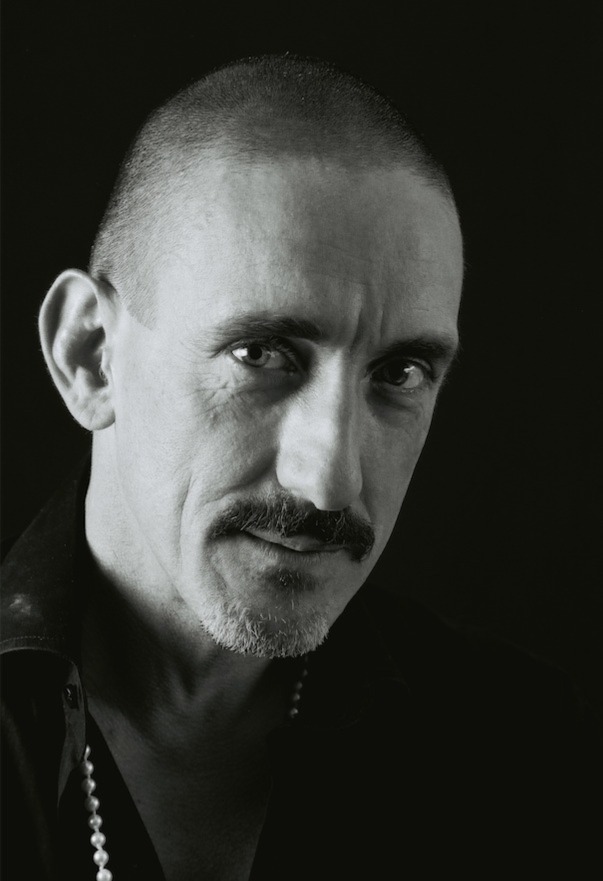
Neil Bartlett
From 1994 to 2005 Bartlett was Artistic Director of the Lyric Hammersmith, and his work there earned him both an OBE and a nomination of an Olivier Award for Outstanding Theatrical Achievement. In 2008 he was awarded an honorary degree by Brookes University Oxford in recognition of his pioneering and longstanding commitment to gay culture and civil rights; this year, his fifth and most recent novel, Address Book, has been shortlisted for the Polari Prize.
Theatre includes: Berenice, The Game of Love and Chance, In Extremis, Or You Could Kiss Me (National Theatre); The Dispute, The Prince of Homburg (RSC); The Picture of Dorian Gray (Abbey); Everybody Loves a Winner, Twenty-Four Hours of Peace (Royal Exchange); Great Expectations (Bristol Old Vic); Oliver Twist, A Christmas Carol, Sarrasine (Lyric Hammersmith); Night After Night (Royal Court). Orlando
Virginia Woolf
Born in London in 1882, Virginia Woolf is acknowledged today as one of the most innovative writers of the twentieth century. In her acclaimed novels – Mrs Dalloway (1925), To the Lighthouse (1927), Orlando (1928), The Waves (1931), The Years (1937) and Between the Acts (1941) – Woolf explored ideas such as time, memory and the subconscious through a ‘stream of consciousness’ narrative technique that allowed her to depict the inner lives of her characters. In addition to novels, Woolf wrote many biographies, essays, diaries and letters. Among her celebrated polemics, A Room of One’s Own (1929) and Three Guineas (1938) explored the position of women in contemporary society. With her husband, Leonard Woolf, Virginia Woolf established the Hogarth Press in 1917 and published works by, among others, EM Forster, Katherine Mansfield and TS Eliot. She had a significant impact on the writers, artists and intellectuals surrounding her, who came to be known as the ‘Bloomsbury Set’ after the area in London where the Hogarth Press was based. Woolf experienced depression all her life and, anxious of its recurrence, eventually committed suicide in 1941.
(In order of speaking)
Virginia/s (Jessica Alade, Debra Baker, Akuc Bol, Lucy Briers, Richard Cant, Melissa Lowe, Jodie McNee, Oliver Wickham, Millicent Wong)
Virginia Woolf (1882-1941): Acclaimed twentieth-century author, pioneer of Modernist movement, whose celebrated novels include Mrs Dalloway (1925), To the Lighthouse (1927) and Orlando (1928).
‘She has steel-rimmed glasses, inky fingers, a long skirt, an old cardigan… Decisive upper-class (accent)… Virginia speaks as a chorus; that is, sometimes solo, sometimes in twos or threes.’
Orlando (Emma Corrin)
Starts the play as a 15-year-old noble boy – ‘A glorious tangle of hair, and an adolescent top-lip shadow’ – before metamorphosing into a woman aged 30. Despite a turbulent emotional life, Orlando holds several high-ranking public positions throughout his/her early adulthood. Privately, though, they’re truly a poet asking the great philosophical questions of life: Who am I and who do I love?
Mrs Grimsditch (Deborah Findlay)
Middle-aged ‘Serving Woman’ to Orlando, also known as ‘Mrs G’. A loyal companion and confidant throughout Orlando’s lifetime – a purveyor of historical facts, theatrical lore and much gossip.
Queen Elizabeth I (Lucy Briers)
Queen Elizabeth I (1533-1603), otherwise known as ‘Gloriana’ or ‘The Virgin Queen’ – ‘An astonishing vision of Magnificence and Death’. She is keen to offer Orlando a privileged position at court – and in her bed – but is angered to discover the proud boy is no longer a virgin.
Clorinda (Oliver Wickham)
One of three Jacobean debutantes – ‘They are gorgeous… Each lady has an envelope, with her motto written on the front, and her CV inside.’ Clorinda’s inscription reads: ‘Who chooseth me shall get what he deserves.’ She’s ‘well-mannered… nice eyelashes – rather under the influence of the family priest.’ Despite a birth and fortune equal to Orlando’s, and therefore a good match, the young nobleman rejects her.
Favilla (Debra Baker)
The second of the three Jacobean debutantes, Favilla’s inscription reads: ‘Who chooseth me, must hazard all he hath.’ The second daughter of a landowner in North Somerset – ‘Good on a horse,’ but, ‘has an unfortunate tendency to beat her dogs’. Orlando dismisses her: ‘Front teeth growing inwards; always a sign of cruelty in a woman.’
Euphrosyne (Akuc Bol)
The third and final of the three Jacobean debutantes, Euphrosyne’s inscription reads: ‘Who chooses me, gains many men’s desire.’ Real name Lady Margaret O’Reilly Tyrconnell: ‘Major Irish ancestry – and major Irish land. Speaks Italian; perfect teeth… the ideal wife.’ Orlando remains disinterested: ‘I do not choose what many men desire.’
Sasha (Millicent Wong)
‘A boyish figure… Sasha speaks a foreigner’s English, and keeps a heavy Russian accent.’ Full name Princess Natasha Iliana Romanovitch, Sasha has accompanied the Russian Ambassador to England. She tempts Orlando to commit a ‘scandal’ by making love with her on their first meeting, before proposing they run away together that same night. Ultimately, though, Sasha abandons Orlando, leaving him heart-broken for the first time in his life.
Harriet (Richard Cant)
‘A Jacobean woman… Predatory; a mask.’ An archduchess of ‘considerable fortune’, Harriet attempts to woo Orlando from his solitary existence to a life of comfort and ease by her side. Orlando politely declines, preferring his isolation, but Harriet insists that everyday passions – and she herself – will return.
Naval Officer (Lucy Briers)
A true exemplar of Her/His Majesty’s Royal Navy, and of Great Britain and its Empire in general… Utterly defeated by the sight of a woman in her underwear.
The Captain (Debra Baker)
Another heroic Naval man: clipped accent, stiff upper lip, always ‘holds himself rigidly erect’. Both he and his officer do their best to protect their honoured passenger’s dignity, much to the amusement and frustration of the recently-transformed Orlando.
Wit One (Oliver Wickham)
‘Full-on Restoration wig, cane and handkerchief acting, displaying himself like a pigeon’ – An exaggeration of an eighteenth-century satirist, celebrated for their dexterous thought and wordplay, typified by writers such as Alexander Pope (1688-1744).
Wit Two (Debra Baker)
Another example of verbal excess – ‘Simply crosses and exits (the stage) while still talking.’
Harry (Richard Cant)
Actually Archduchess Harriet from before, but now ‘removes her wig… to make fully plain that “she” is in fact a man in drag’. As before, he seeks a mutually advantageous union with Orlando, married and living abroad, and as before Orlando declines.
Nell (Millicent Wong)
A young prostitute working in eighteenth-century London whom Orlando befriends, preferring companionship and conversation to coitus.
Prue (Akuc Bol)
Another ‘working girl’ who shares a room with Nell.
Kitty (Richard Cant)
Nell and Prue’s ‘maid’ and supplier of much-needed alcohol and distraction.
Marmaduke (Jodie McNee)
Full name Marmaduke Bonthrop Shelmerdine, Esquire – ‘He is tall, dark, handsome and aristocratic, combining in one dashingly frock-coated package the sexual allure of both Colin Firth as Mr D’Arcy and Vita Sackville-West in jodphurs.’ He meets, instantly falls in love with and marries Orlando, then immediately has to set sail to work in the colonies overseas, this being the height of nineteenth-century British imperialism.
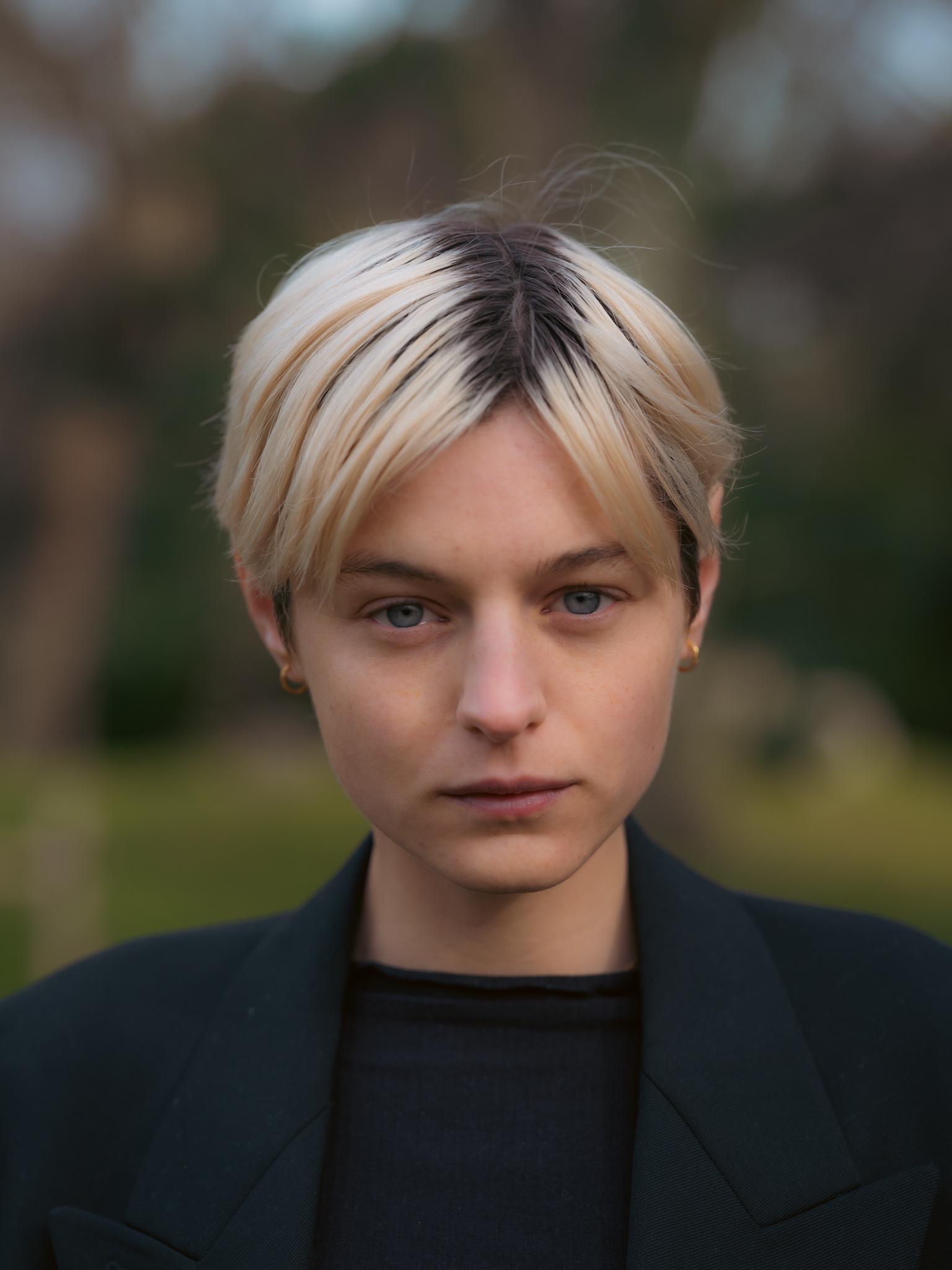
Emma Corrin
Orlando
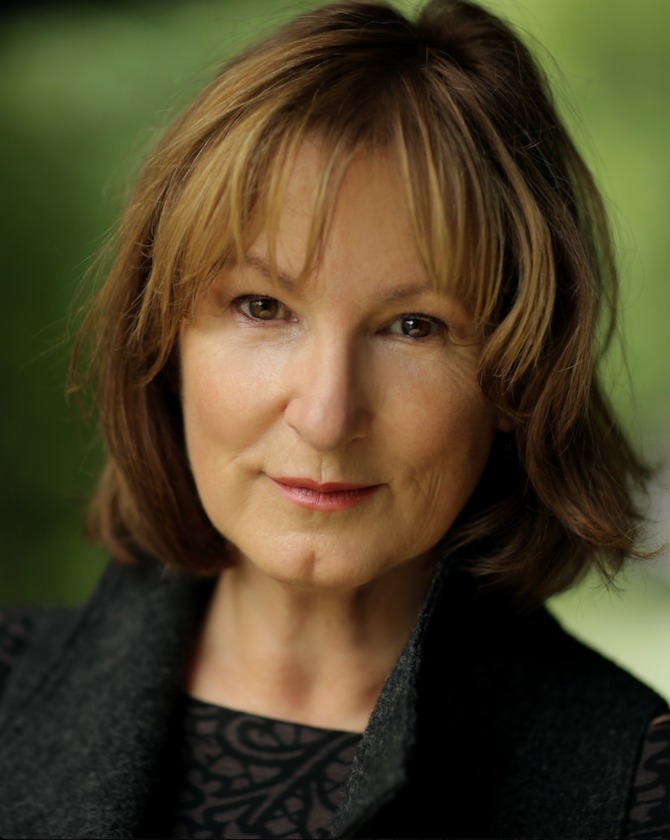
Deborah Findlay
Mrs Grimsditch
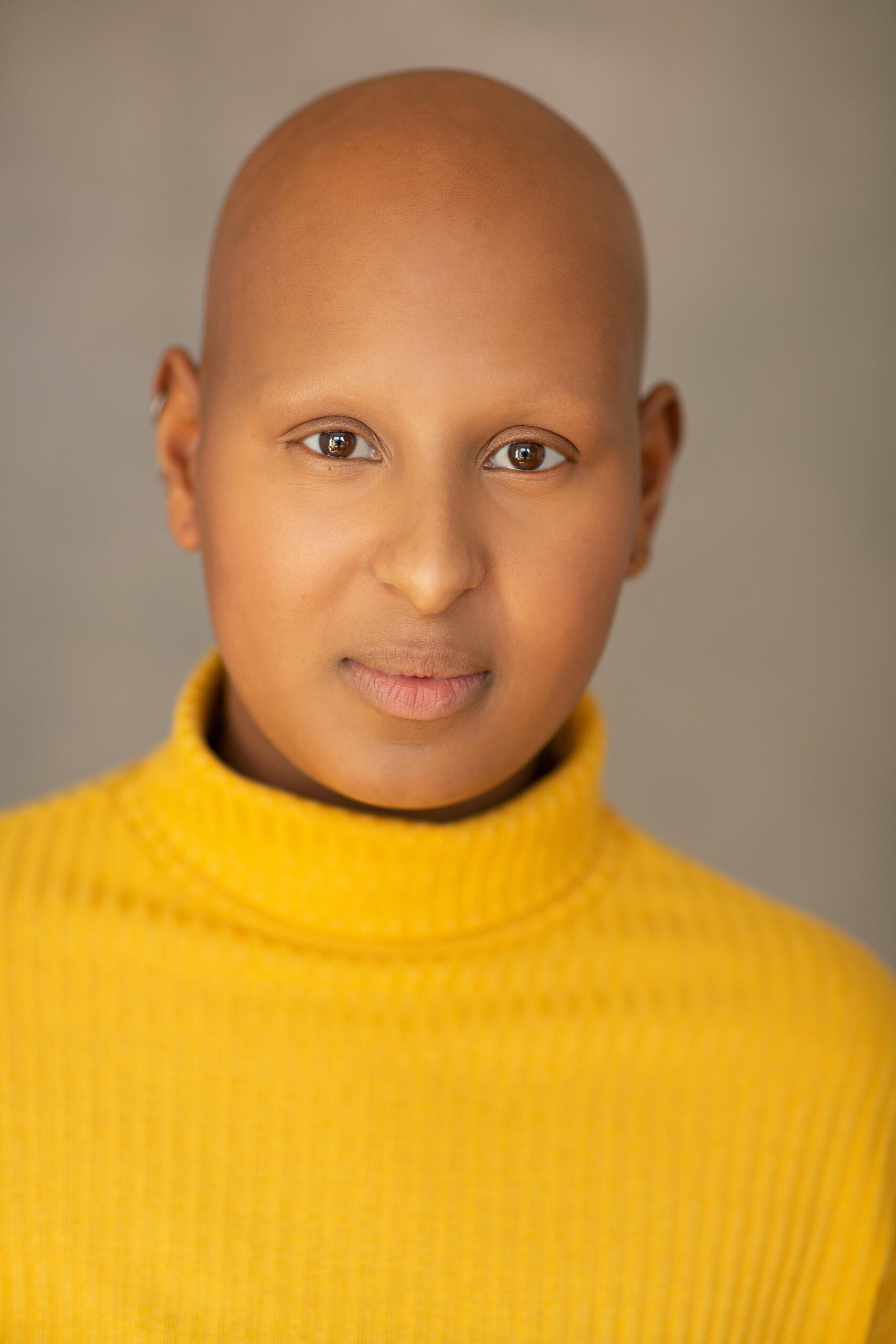
Jessica Alade
Virginia, Drunken Tory, Understudy Queen Elizabeth I, Officer, Favilla, A Wit, The Captain, Marmaduke
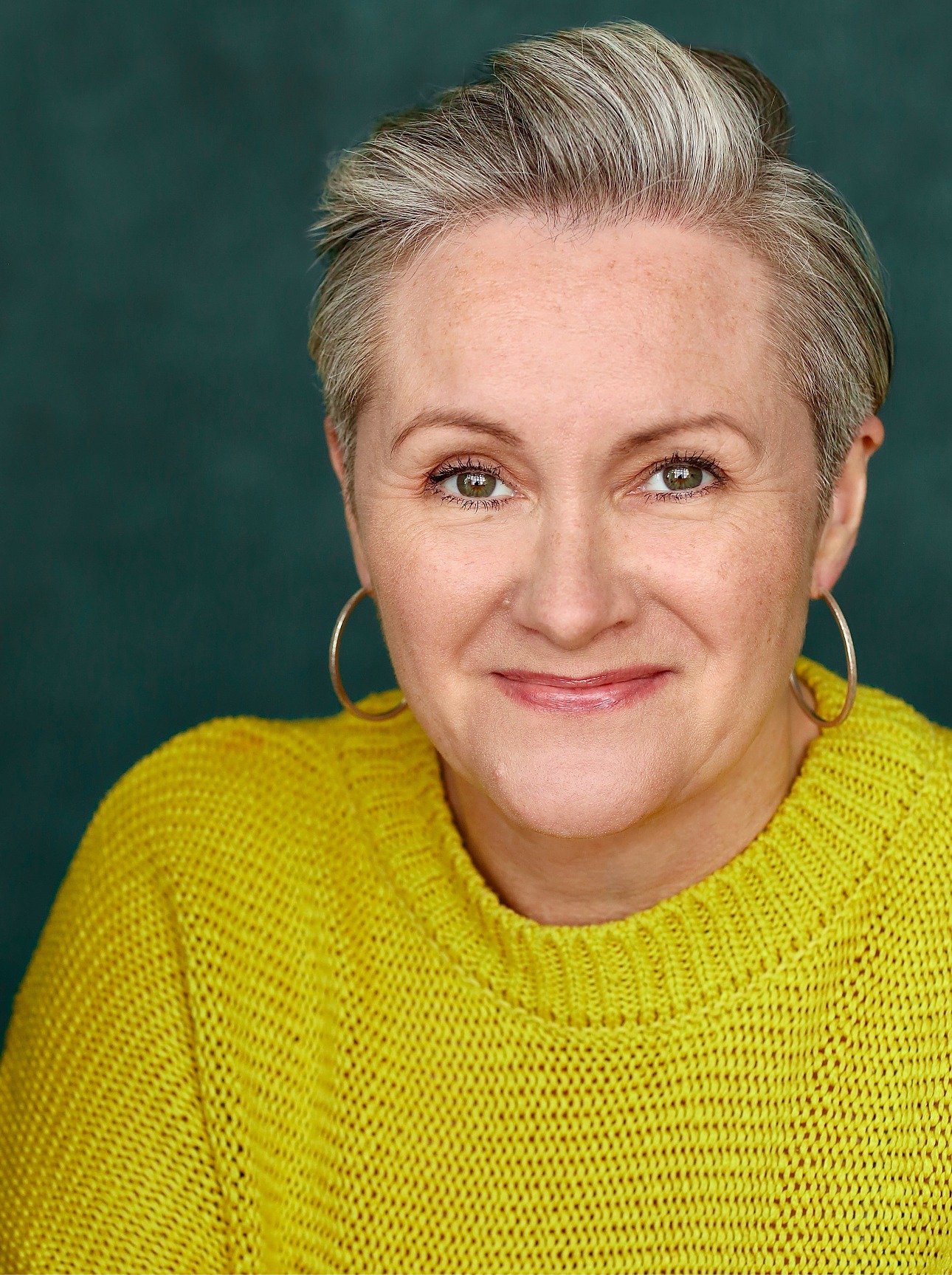
Debra Baker
Virginia, Favilla, A Wit, The Captain, Understudy Mrs Grimsditch
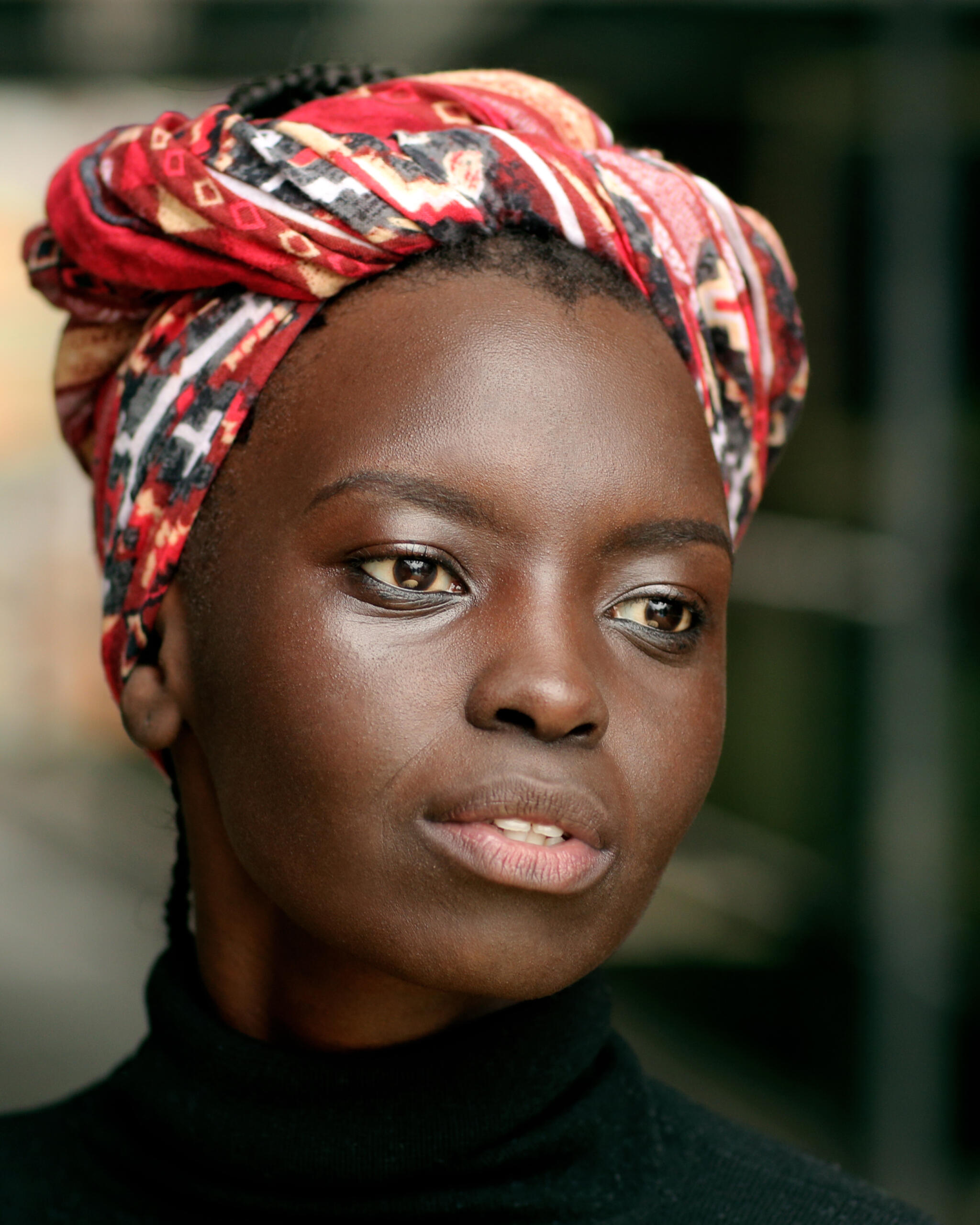
Akuc Bol
Virginia, Euphrosyne, Prue, Understudy Sasha, Nell
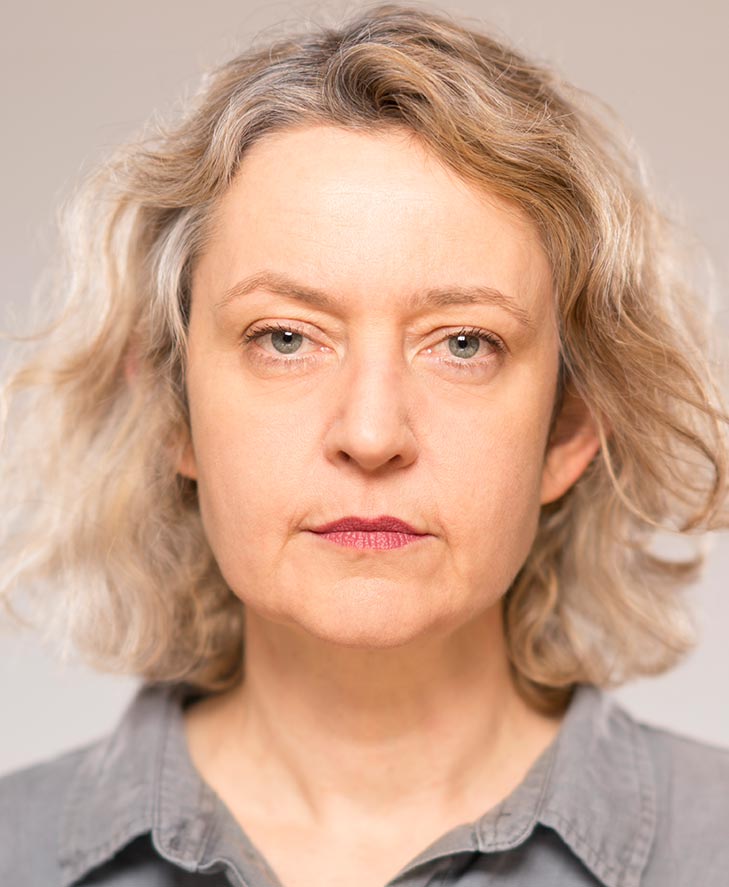
Lucy Briers
Virginia, Queen Elizabeth I, Officer
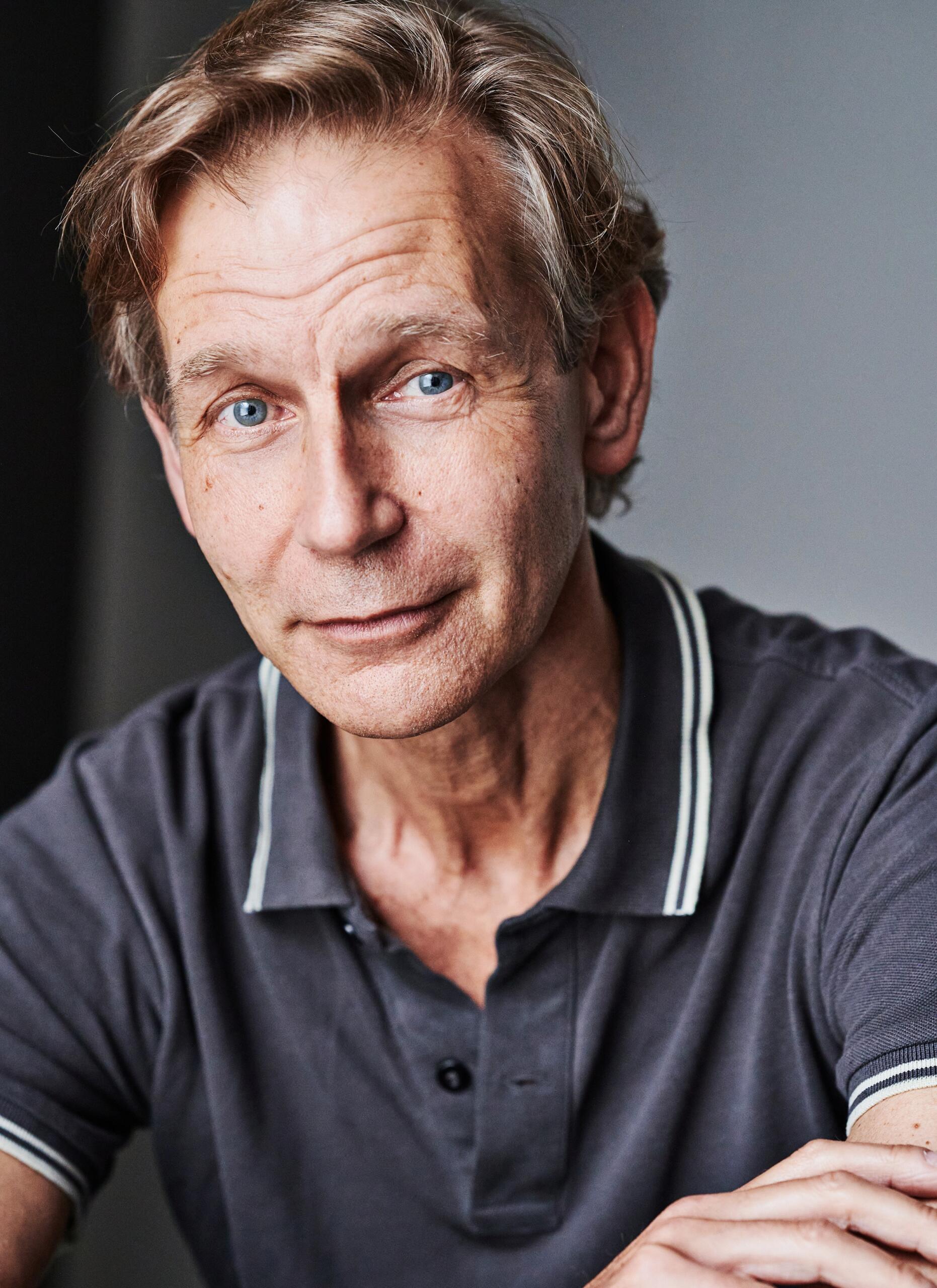
Richard Cant
Virginia, Harriet, Kitty
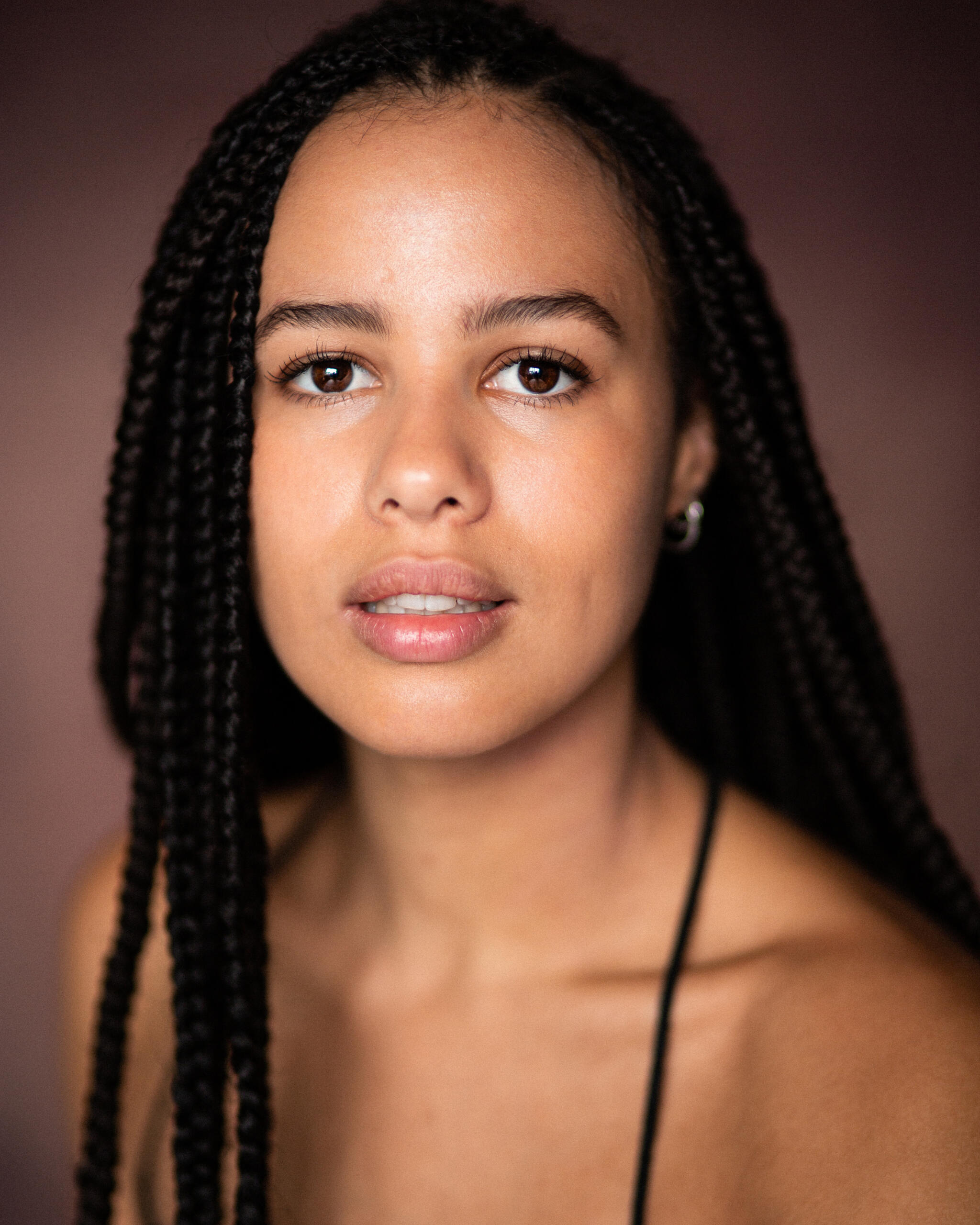
Melissa Lowe
Virginia, Drunken Tory, Understudy Clorinda, A Wit, Euphrosyne, Prue, Harriet, Kitty
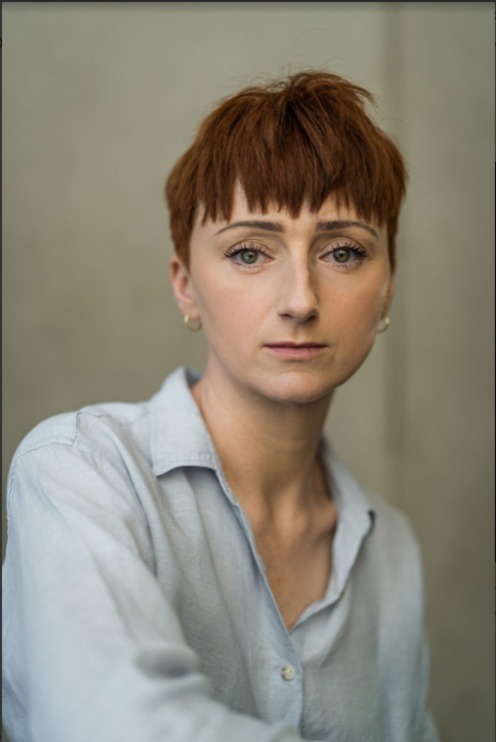
Jodie McNee
Virginia, Marmaduke
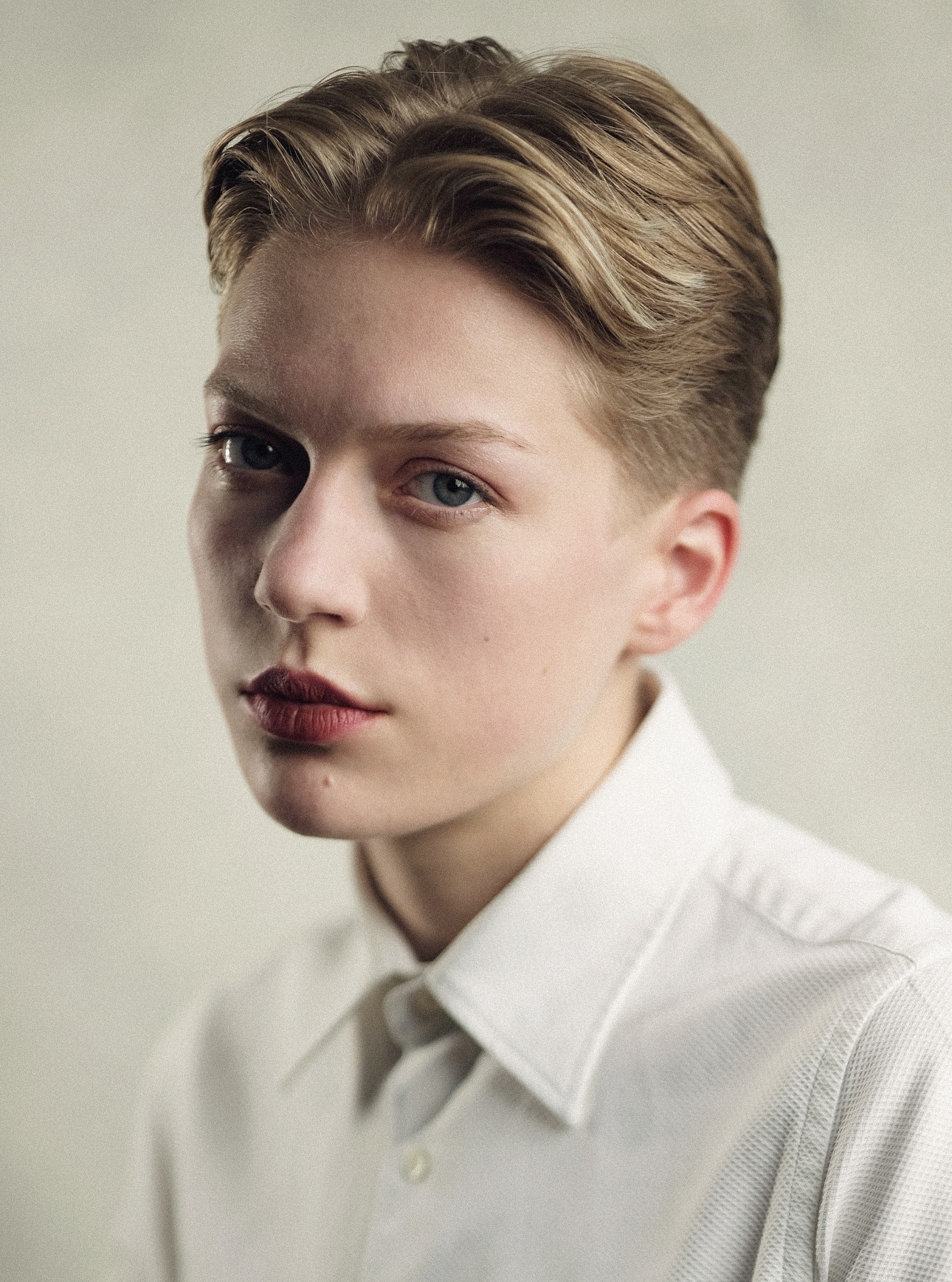
Oliver Wickham
Virginia, Clorinda, A Wit, Understudy Orlando
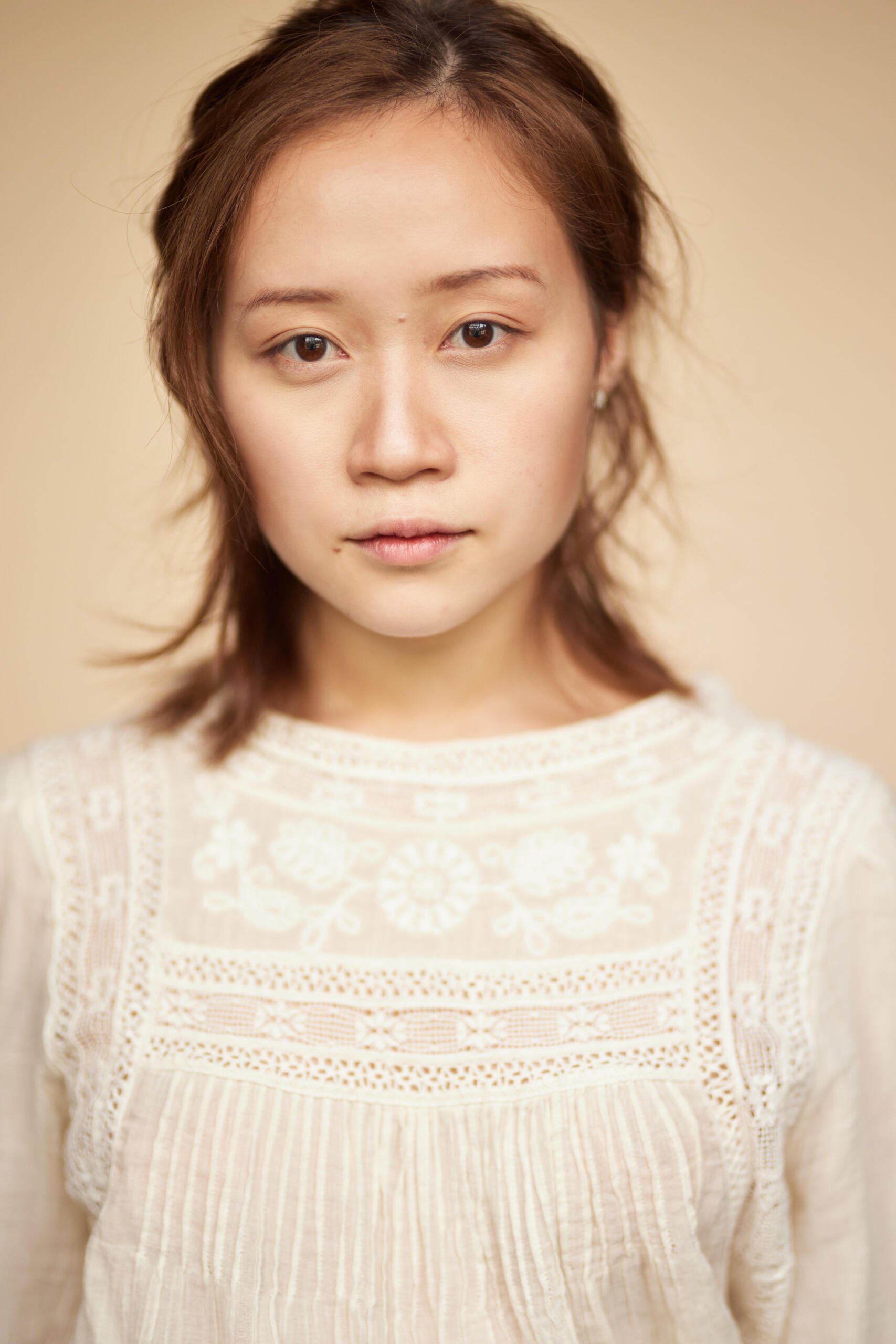
Millicent Wong
Virginia, Sasha, Nell
In conversation: Michael Grandage and Neil Bartlett
MG: Nearly 100 years ago, Virginia Woolf was discussing gender identity in her novel Orlando. Was she ahead of her time or have we just taken a little while to catch up?
NB: I think we’re still catching up. The moment in which she wrote this novel is one of extraordinary ferment. She was in the forefront of the feminist fight for rights for all women, whatever their gender preference, writing her extraordinary collection of lectures to the female undergraduates of Cambridge called A Room of One’s Own, where she changes English Literature forever by asking the very simple question: what would have happened if Shakespeare had a sister? Shortly afterwards, she publishes Orlando which contains the incendiary idea: why can’t the hero of a novel become a heroine and see life from both perspectives? Towards the end of the novel, through her then heroine Orlando, she tells us “I have tried, to honour Happiness; to obey Desire, in whatever form it came – to accept that there may be more forms, and stranger, than we know”.
MG: Can you remember the first time you read Orlando and what you felt?
NB: The first time I read it I was a teenager and I read it for the worst of possible reasons, that I thought I ought to read Virginia Woolf. I tried The Waves first, then Orlando but I couldn’t find my way. Years later, my husband and I spent a decade living in Sussex and some weekends we used to walk our dog along the river at Rodmell. I used to walk past Woolf’s house and across that extraordinary countryside and for the first time, she became a real and vivid person for me. Then a good friend of mine said to me ‘Neil, you are no longer a teenager. Try Woolf again!’ He gave me Orlando, and I read it, and that was when my writer’s mind thought, what if you tried to put this amazing story on the stage?
MG: And in putting it on the stage, you’ve decided to have Virginia Woolf represented by many facets of herself. Can you talk a little about that decision?
NB: An important fact about Orlando the book is it was written in the aftermath of an infatuation, and Woolf gave the manuscript to the woman she had fallen in love with and who had inspired it. You hear Woolf’s sentences tumbling over each other and revolving and fracturing. That’s where I got the idea that Woolf should be on stage, imagining right in front of you all the possibilities of her story. And then, Woolf is the great artist of the multiple. For Woolf, the definition of modernity is that you have to try and see life in the round. So that took me to the idea of a woman passed through a prism, refracted into different and conflicting elements.
MG: And did you want that multiplicity to reflect anything to do with the discussion of gender in the novel?
NB: Having had that idea, that there would be different selves to our Virginia, that then meant we could cast the show in a way that could embody those many different aspects. For instance, she was married, but in love with another woman, the glamorous Vita Sackville-West. She was a hard working and very successful author, but now she was sitting down to write something which was bound to upset a lot of people because of its frankness about the sheer giddy multiplicity of life’s possibilities. We wanted our company to embody that moment, where Woolf is opening herself up to the possibilities of sexuality and gender identity in all their glorious multiplicity.
MG: Woolf’s Orlando travels through time, starting in the court of Queen Elizabeth I and ending in the present day. In turning this novel into a piece for theatre, you’ve celebrated the theatre’s great tradition for language and the way we’ve evolved – can you talk a little bit about that?
NB: One of the biggest challenges of adapting the story is you have to travel through time. We see Orlando rifle the wardrobe of English cultural history and I wanted to do the same to theatrical history. When Orlando is living in the age of Shakespeare, he speaks Shakespeare. When Orlando is the young ardent man in love, for instance, he quotes Romeo. As that love sours, we move into the dark and dangerous world of John Webster and the Jacobeans. Then in the Restoration, we have Congreve and Pope – so that as Orlando’s body moves through time, we move through a library of theatrical styles. At the end, pure Woolf. The last two pages of the script are entirely her voice.
MG: If I could give you one telephone call with Virginia, what would you want to say to her?
NB: I’d say “Thank you.” In her story, she gives Orlando some parting advice – and remember Woolf was saying this back in 1928. She says ‘If you can just hold on another hundred years. If we can just acquire the habit of freedom.’ That’s wonderful advice. It isn’t enough to invent or imagine freedom, you must work patiently and courageously so that freedom becomes not just a doorway but the landscape in which we all live as a society.
